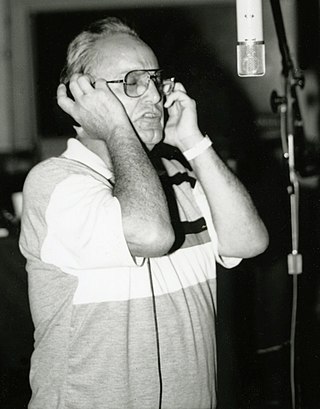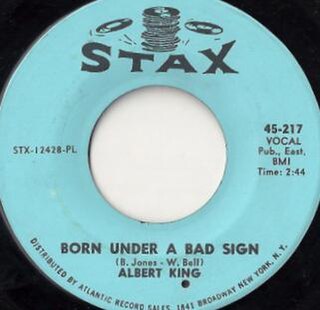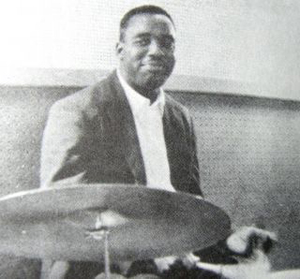Related Research Articles

New Orleans rhythm and blues is a style of rhythm and blues that originated in New Orleans. It was a direct precursor to rock and roll and strongly influenced ska. Instrumentation typically includes drums, bass, piano, horns, electric guitar, and vocals. The style is characterized by syncopated "second line" rhythms, a strong backbeat, and soulful vocals. Artists such as Roy Brown, Dave Bartholomew, and Fats Domino are representative of the New Orleans R&B sound.

De Luxe Records was a record company and label formed in 1944 by brothers David Braun (1908–1985) and Julius "Jules" Braun (1911–2002), the sons of Hungarian Jewish immigrants, in Linden, New Jersey. The label flourished in the 1940s and 1950s, notably for its rhythm and blues (R&B) and early rock and roll recordings.

David Louis Bartholomew was an American musician, bandleader, composer, arranger, and record producer. He was prominent in the music of New Orleans throughout the second half of the 20th century. Originally a trumpeter, he was active in many musical genres, including rhythm and blues, big band, swing music, rock and roll, New Orleans jazz, and Dixieland. In his induction into the Rock and Roll Hall of Fame, he was cited as a key figure in the transition from jump blues and swing to R&B and as "one of the Crescent City's greatest musicians and a true pioneer in the rock and roll revolution".
Swamp pop is a music genre indigenous to the Acadiana region of south Louisiana and an adjoining section of southeast Texas. Created in the 1950s by young Cajuns and Creoles, it combines New Orleans–style rhythm and blues, country and western, and traditional French Louisiana musical influences. Although a fairly obscure genre, swamp pop maintains a large audience in its south Louisiana and southeast Texas homeland, and it has acquired a small but passionate cult following in the United Kingdom, and Northern Europe

Eddie Jones, known as Guitar Slim, was an American guitarist in the 1940s and 1950s, best known for the million-selling song "The Things That I Used to Do", for Specialty Records. It is listed in the Rock and Roll Hall of Fame's 500 Songs That Shaped Rock and Roll. Slim had a major impact on rock and roll and experimented with distorted tones on the electric guitar a full decade before Jimi Hendrix.
Thaddeus Bunol "Tad" Jones was an American music historian and researcher. His extensive research is credited with definitively establishing and documenting Louis Armstrong's correct birth date, August 4, 1901.

Barbara Lynn is an American rhythm and blues and electric blues guitarist, singer and songwriter. She is best known for her R&B chart-topping hit, "You'll Lose a Good Thing" (1962). In 2018, Lynn received a National Heritage Fellowship.
Huey Pierce "Piano" Smith was an American R&B pianist whose sound was influential in the development of rock and roll.

Rod Bernard was an American singer who helped to pioneer the musical genre known as "swamp pop", which combined New Orleans-style rhythm and blues, country and western, and Cajun and black Creole music. He is generally considered one of the foremost musicians of this south Louisiana-east Texas idiom, along with such notables as Bobby Charles, Johnnie Allan, Tommy McLain, and Warren Storm.
Robert Charles Guidry, known as Bobby Charles, was an American singer-songwriter.

Joseph Denton "Jay" Miller was an American record producer and songwriter from Louisiana, whose Cajun, swamp blues, and swamp pop recordings influenced American popular culture.

Apollo Records was a record company and label founded in New York City by Hy Siegel and Ted Gottlieb in 1944. A year later it was sold to Ike and Bess Berman. Apollo was known for blues, doo-wop, gospel, jazz, and rock and roll.
Warren Storm was an American drummer and vocalist, known as a pioneer of the musical genre swamp pop; a combination of rhythm and blues, country and western, and Cajun music and black Creole music.

"Born Under a Bad Sign" is a blues song recorded by American blues singer and guitarist Albert King in 1967. Called "a timeless staple of the blues", the song also had strong crossover appeal to the rock audience with its synchronous bass and guitar lines and topical astrology reference. "Born Under a Bad Sign" appeared on the R&B chart and became a blues standard.

Ric Records, along with sister label Ron Records, were American record labels formed by Joe Ruffino in 1959. Although most of Ric's releases did not rise above regional hits, the label was active during the golden era of New Orleans R&B and was an incubator for many artists who are now recognized as definers of the style.
Elton Anderson was an American singer and swamp pop pioneer who had a chart hit on Mercury Records.
Willie Monroe Vincent, who used the stage name Polka Dot Slim and was also credited as Vince Monroe, Mr. Calhoun, and Poka-A-Dot Slim, was an American blues singer and harmonica player.
Lanor Records is an American record label based in the bayou region of Louisiana. It is known for its issues of Cajun and zydeco music.
Nola Records was an American independent record label based in New Orleans.

Charles "Hungry" Williams was an American rhythm & blues drummer, best known for the innovative and influential technique he used on numerous recordings that came out of New Orleans in the 1950s and 1960s.
References
- 1 2 3 4 5 6 Steve Cushing, Pioneers of the Blues Revival, University of Illinois Press, ISBN 0252096207, 2014, p.166
- ↑ "A Woodie Speaks" (PDF). Tftw.org.uk. Retrieved 1 May 2024.
- 1 2 "Record Makers and Breakers by John Broven". PopMatters. 7 June 2009. Retrieved 21 January 2020.
- 1 2 3 4 5 John Broven: Biography. Johnbroven.com, Retrieved 4 February 2020
- 1 2 3 Wirt, John. "Soundcheck: Five Questions with John Broven, author of Rhythm & Blues in New Orleans". OffBeat Magazine. Retrieved 21 January 2020.
- ↑ Wirt, John. "'South to Louisiana,' definitive book on state music history, receives updated second edition". The Advocate. Retrieved 21 January 2020.
- ↑ "John Broven". Wwno.org. Retrieved 21 January 2020.
- ↑ "Record Makers and Breakers: Voices of the Independent Rock 'N' Roll Pioneers > John Broven « American Songwriter". American Songwriter. 1 July 2009. Retrieved 21 January 2020.
- ↑ Fensterstock, Alison. "Seminal music text 'Rhythm & Blues in New Orleans' to get update, after nearly 40 years". Nola.com. Times-Picayune. Retrieved 21 January 2020.
- ↑ Broven, John. "UI Press | John Broven | Record Makers and Breakers: Voices of the Independent Rock 'n' Roll Pioneers". Press.uillinois.edu. Retrieved 21 January 2020.